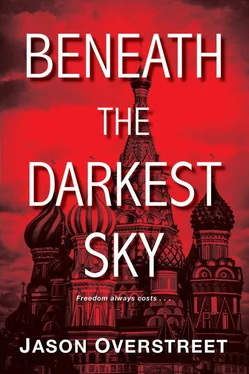My meeting with him had been brief. We’d driven along the Moscow River in his roadster, he behind the wheel.
“Their spy apparatus is even more elaborate than I’d thought,” he’d said. “But I’m certainly very happy that you found out exactly where the microphones are. You’ve truly gone above and beyond, Prescott. It gives me peace of mind to know that my instincts are still as good as ever. We’ll keep this between you and me. No need to alarm the staff. And when the next ambassador replaces me, I’ll decide then whether or not to tell him about the secret tunnel and shaft. But I must say, the story about the dwarf paints a vivid picture. He’s probably up there right now squirming about. Gives me the creeps.”
“Indeed,” I’d said.
“We’ll certainly be one step ahead of them now.”
Since that meeting with the ambassador back in April, I hadn’t seen him even once. I’d heard that he’d been very upset about Litvinov reneging on a key component of the “Gentleman’s Agreement.” Over the summer, the Communist Party of the Soviet Union had hosted a meeting of the Third International. American communists attended and this was a clear violation of Litvinov’s promise to Roosevelt that they’d stay out of domestic affairs. Bobby believed that Bullitt had almost completely given up on Moscow, and was actually looking to leave.
* * *
When Loretta and I walked into the Foreign Workers’ Club, the place was packed with several white members of the Communist Party, a good percentage of them American, although to be fair, lots of people in attendance were not Party members. This is where folks liked to smoke, socialize, and drink. It wasn’t a bad place to be seen frequenting in the eyes of the gun-toting blue tops either. NKVD believed that folks who hung out here could be trusted.
In the lobby, we walked past a large sign that had some very familiar words on it. It was a quote from Stalin, and we’d seen it all over town lately. It read, “LIFE HAS BECOME BETTER, COMRADES; LIFE HAS BECOME MORE JOYFUL.” Continuing through, we spotted Lovett and his wife sitting at a corner table near the back, which was unusual. For him not to be holding court was a shock to my eyes. But at least they were smiling and conversing.
“Ain’t you two a sight for sore eyes!” he said, standing and kissing Loretta on the cheek before he and I slapped hands. “My brother Bronzeville Sweet is up in the house!”
“Good to see you, Lovett.”
His wife B stood and we hugged her before all of us sat. B was a lovely, regular built, brown-haired woman who dressed rather plainly, as most Russian women did. And she always seemed to let Lovett do most of the talking. She was still trying to teach him Russian, but he wasn’t taking to it very well. Luckily for him, her English was good enough to allow them to communicate effectively. Their love of science is what had initially brought them together while he was studying fish breeding at Moscow State University, and she was employed at a scientific research institution.
“I’ll be right back,” said B, leaving.
“She’s going to grab us four beers,” said Lovett. “My lovely wife is so, so good to me. Love her to death! Anyway… you know who I’ve been thinking about a lot lately? Alexander Pushkin!”
“Why’s that?” I said.
“He’s the most famous Russian Negro of all time, that’s why. And I love his poems. Don’t you, Comrade Sweet, my American brutha whom I love like no otha ?”
“I do. I like his poem ‘The Gypsies.’”
“Hot damn, me too!” said Lovett, reaching across the table and touching Loretta’s hand. “I should not have said I love him like no other, because I love you just as much, Queen Loretta.”
“Thank you, Lovett. You’re the sweetest.”
“When am I going to get you to officially join the Party, dear? Most of the coloreds in Moscow won’t join, so you’re not alone. But I do understand why you can’t, with Comrade Prescott here working for the embassy and all. Still, I’d love to have ya’ join someday, girl!”
“I hear you, Lovett. You keep on doing your recruiting. You’re so good at it. The Party owes you a whole hell of a lot!”
“Thank you, sista! Congrats on this amazing success you’re having with your art! You’re a Moscow celebrity. Ain’t too many of those around here besides Stalin himself. Socialist Realism is a form of painting that I believe was created just for you. I particularly like your paintings that show mothers holding their babies. You really capture Russian women. B has said as much.”
“It’s in the eyes,” said Loretta. “At least that’s what I believe. None of the women are smiling, but the joy is in their eyes. It’s the kind of authentic joy that only a mother who has given birth to this beautiful being they’re now holding in their arms can truly understand. That’s the essence of my paintings.”
“You talking about your masterful works of art?” said B, setting four bottles of beer on the table. “Your paintings are hanging in some very important houses. I will certainly drink to that.”
We held up our green bottles, clinked them, and all took a swig.
“Any concern that the State frowns on other forms?” said Lovett.
Loretta looked at him and contemplated. “No, I have found my calling. I love this form. And I love finally being recognized and appreciated. It’s nice to be honored for your art. New to me! And I love the humble way the people of Moscow show their appreciation. It’s sincere, but not over-the-top praise or worship.”
“Believe me,” said B, “they are worshipping you in the privacy of their homes. You are probably going to have Stalin send word that he’d like for you to paint him. I can see this happening very soon because of how your name is being talked about. Moscow is claiming you as its own. You will have to become a Soviet citizen very soon.”
“Paint a portrait of Stalin?” said Loretta, looking surprised.
“No pressure there!”
“And that’s my point,” said Lovett. “Why should you feel such pressure in such a case? It’s because Stalin is too domineering and rules with an iron fist.”
“I agree,” I said.
“No,” said B.
“No,” said Loretta. “He is simply trying to create rule of law. There are too many folks who still long for the czarist times. They believe in a system that has a ruling upper class and a starving lower class. Stalin can’t afford to let them regain power. His current Five Year Plan is effectively industrializing the entire country, and soon everyone will be operating on a completely level playing field, with equal-paying jobs and equal shares of food, etcetera.”
“Sounds good,” said Lovett, “but Stalin, the Politburo, and the entire Central Committee are the ones living like czars. Them niggas is eatin’ damn caviar! They seem to be the ruling upper class you speak of. I fear they have forgotten to read from the communist playbook. But I digress.”
“Perfectly articulated,” I said. “I’ve been trying to tell Loretta this for the—”
“Just stop, Prescott!” she said, somewhat angrily. “Everyone has varying opinions about how the revolution should take form. The Central Committee and Politburo are not some crazy, iron-fisted body. They are clearly in the throes of recreating a societal structure that meets the needs of everyone. They are undoing centuries of evil, barbaric, czarist damage. And they have to operate with some semblance of order and authority. Otherwise the old, fat, set-in-their-ways cats will eat us new, hungry, revolutionary mice, so to speak. Simple!”
“Yes,” said B. “Anything new is met with strong opposition. Stalin’s ways are new. Collective farms are new. Hiring thousands of foreign workers is new. Bringing in all of this new technology and machinery is new. Strengthening and globally growing the Communist Party is new. We are rebuilding an entire new country. I for one am not afraid of new.”
Читать дальше











